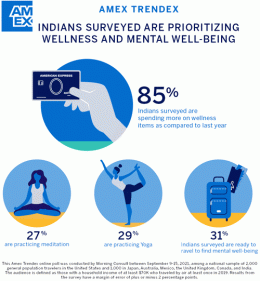Hidden toll of India’s COVID-19 pandemic

More than two-thirds of Indian consumers surveyed in a global trend report indicate that their mental health has been impacted by the pandemic – either by isolation restrictions or concerns for well-being.
According to the Amex Trendex report, a further 85% agree that they are spending more on wellness items compared to previous years, ahead of all other surveyed countries.
The trend report from American Express, showed consumers surveyed in the United States, United Kingdom, Australia, Japan, Mexico, India, and Canada are investing more time and money in their physical and mental health to combat the toll the COVID-19 pandemic has taken on their well-being.
Dr Poonam Khetrapal Singh, Regional Director of the World Health Organisation noted that while there has been an increase in demand, the critical mental health services have either been disrupted or halted.
Bereavement, isolation, loss of income, anxiety and fear have triggered mental health conditions or worsened existing ones. This has increased the risk of severe outcomes for people with pre-existing mental, neurological or substance use disorders.
“Most of the Member countries currently spend less than 1% of their health budgets on mental health despite evidence of high returns on the investment for care and treatment of mental health disorders, and despite growth in mental health awareness,” she said in a statement here.
The WHO South-east Asia Region which is home to one-fourth of the global population accounts for 39% of the nearly 700,000 suicides that take place globally every year. Suicide is the leading cause of death among young people aged 15-29.
Here are some key findings of the survey in India;
· Surveyed Indian consumers are spending more on natural vitamins and supplements (59%), in-home fitness equipment (56%) and organic food (58%)
· Indian consumers surveyed are also spending on experiences as 92% of survey respondents agree that they want to spend more on travel to improve their well-being
· Majority of Indian adults surveyed agree they would choose to have stronger mental health over a new car (93%) and 89% agree they would give up their favourite TV show for it
· Surveyed Indian consumers say exercise (43%), listening to music (34%), taking mental breaks during the day (going on a walk or drive, coffee break, etc.) (32%), and meditation (32%) have the greatest positive impact on their mental health
· Indian consumers surveyed rank prioritizing clean eating during the week and indulging on the weekends (32%), doing mental health activities with family such as journaling or using meditation apps (32%), and organizing a wellness activity for family and friends and/or colleagues (32%) as having the greatest positive impact in supporting their mental health
· 83% of surveyed Indian consumers have taken advantage of new mental health resources during the pandemic.
· 66% of surveyed Indian consumers expect to spend much more on travel in the next 12 months than they did last year
· Indian consumers say that to support their mental health is a leading reason they go on vacation (31%), along with to relax and unwind (36%)
· Once there, Indian consumers surveyed are most interested in exploring outdoors (34%), practicing Yoga (29%), meditating (27%), and walking (23%)
· 95% surveyed Indian consumers are likely to base their next vacation around improving their mental well-being
· 90% surveyed Indian consumers are willing to pay extra for wellness activities while on vacation
Indians used to record some of the highest scores in global happiness ratings, but from the summer of 2019, things began to unravel, said another poll.
Ipsos’ Global Happiness Survey 2020 found that, by August 2020, only 66% of Indians described themselves as ‘very happy’ or ‘rather happy’, down 23 percentage points from 2011, and 11 percentage points lower than 2019.
The enforced isolation brought by COVID mitigation measures has amplified the growing sense of social dislocation in India, and across the world, said Ipsos.
All the things that promote a sense of well-being – employment, socializing, going to school, exercising and accessing health services – were curtailed during the pandemic, with mental health paying the price.
Indians are not alone in struggling with the emotional effects of the pandemic. This year’s World Happiness Report found that the pandemic had shaken up lives the world over. As a result, mental health is the third-biggest concern of people globally after coronavirus and cancer.
However, the pandemic has brought people’s mental health, and the need to support it, into sharp focus.
Many companies are embracing positive messaging and developing products to promote self-care, as people are encouraged to talk more openly about the challenges they face.
Modern life is also offering remedies: from smartphones and wearables that track mood and diet to online yoga classes and apps that support mindfulness and relaxation techniques.









